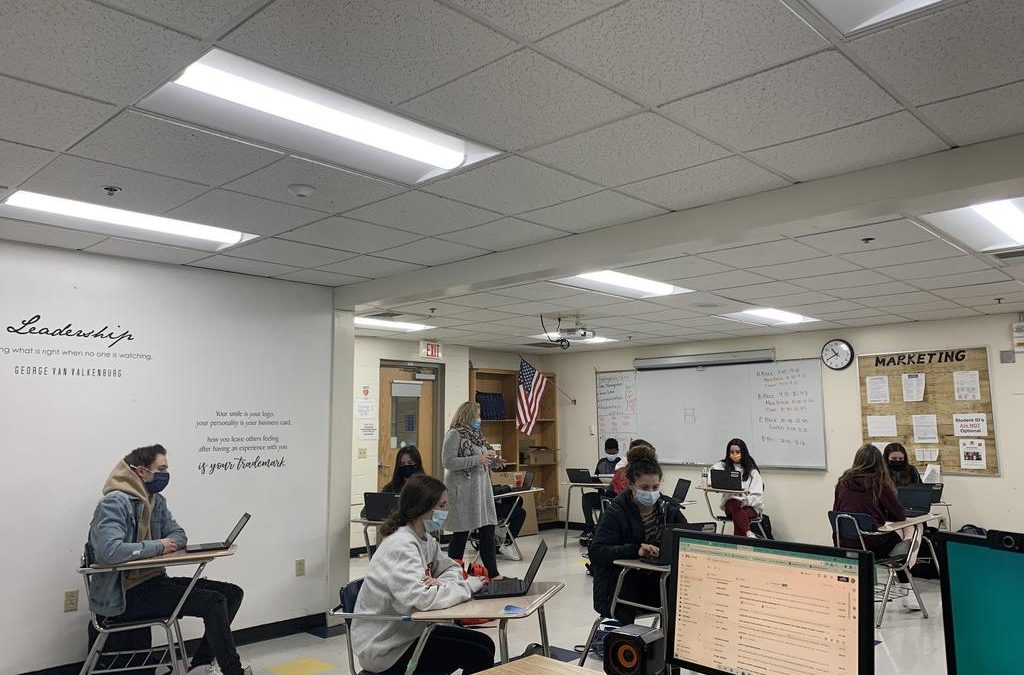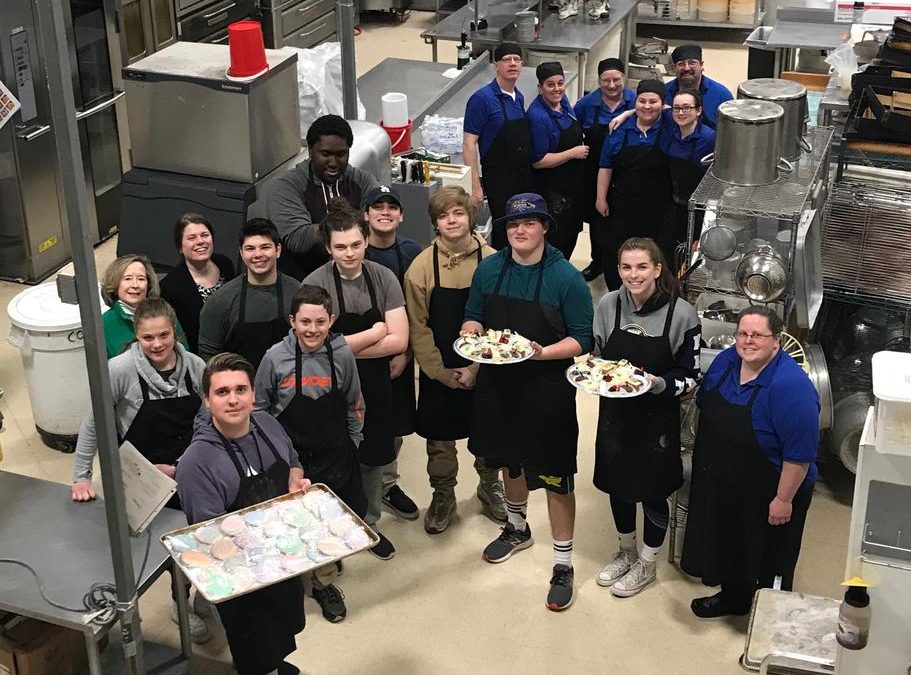
Mar 30, 2021 | Challenges and Opportunities, Impact
In response to the pandemic in 2020, many Career and Technical Education (CTE) centers in New Hampshire began to look at ways to integrate cutting edge technology into its programs.
“Investments in technology have enabled us to create interactive and virtual educational experiences for students,” noted Vaso Partinoudi, director of Career and Technical Education, Milford High School & Applied Technology Center.
She said the challenge to creatively engage students is heightened in CTE programs.
“Our whole focus is to provide experiential and technical training to high school students that prepares them for college and careers,” she said. “This type of learning is hands-on, which is difficult to achieve when you cannot physically get together.”
Emerging online educational learning platforms like Newsela, Pear Deck and Nearpod, however, have provided teachers with the ability to virtually engage students in new ways. Tammy Andrew, a computer science teacher at Milford High School who teaches several CTE classes, cited her use of Nearpod as one example.
“Nearpod enables me to make nearly any educational resource — PowerPoints, Google Slides, or any video — interactive,” she said. “Students can personally or anonymously respond to a video, for instance, and share responses. Students can respond to each other, too.”
In a computer programming class, Andrew said students can begin an assignment on a piece of paper or a Google document. If students are visual, they can use their cell phone or camera to submit an assignment. A digital timer, which can be turned off by the student, provides a countdown for those that require it.
“Students have a voice in how they learn,” said Andrew.
At the height of the pandemic, Kim Daniels, marketing educator at Milford High School & Applied Technology Center, said Nearpod helped teachers conduct synchronous lessons while all students were remote.
“Nearpod allows a teacher to cast a PowerPoint on the students device that the teacher controls,” she said. “It also allows for quick check-ins for understanding through a variety of activities that the students can engage in together as a class, even though they are at home learning alone.”
According to Andrew, the pandemic has accelerated the technology adoption rate by school districts.
“We are two to three years ahead of where we would be otherwise if it were not for COVID-19,” she noted. “We are pushing the abilities of Zoom, Canvas and Nearpod into the future because we need these things now.”
Such technologies, while enhancing CTE, cannot replace hands-on lessons and work-based learning.
“A computer is not a substitute for face to face learning,” Daniels said. “The opportunity to provide instant feedback and offer corrections while we watch students work is missing during remote work days.”
Jen Haskins, president of the New Hampshire Career and Technical Administrators Association, agreed and said all CTE centers statewide are “creatively working” to meet the need for experiential learning in the state.
“We continue to work with many stakeholders, including industry partners, to provide students with real-world learning opportunities like apprenticeships and internships,” she said. “With the aging of New Hampshire’s workforce and the ongoing pandemic, CTE is more important than ever.”
Milford High School & Applied Technology Center is one of 28 CTE centers throughout New Hampshire.

Jan 22, 2021 | Challenges and Opportunities, Impact, Leadership, Ticker
With programs ranging from culinary to marketing, biotechnology and more, Career and Technical Education (CTE) in New Hampshire provides high school students with opportunities to not only learn, but develop their knowledge in real-world settings.
“CTE is experiential career training,” explained Karen Hannigan Machado, principal of The Manchester School of Technology, one of more than two-dozen CTE centers across New Hampshire. “They train on the most up to date equipment and go out and learn in the field and job sites.”
This experiential aspect of CTE prepares high school students in measurable ways.
“They can go right into the job they prepared for in high school, or they will be further ahead in a certification or college program,” she added.
According to Jen Haskins, director of Career & Technical Education at Pinkerton Academy in Derry, CTE’s connection with — and alignment to — post-secondary education is often not understood by the general public.
“The biggest misconception people have is the level of rigor found in CTE classes statewide,” she said.
A majority of CTE classes also offer college credit and certifications in a variety of diverse industries.
“Many CTE students can graduate with six to 18 credits of college classes,” said Haskins, who also serves as president of the New Hampshire Career and Technical Administrators Association.
CTE programs are not, however, tied to specific jobs, but instead lead to “career pathways” that prepare students for a variety of different options.
“CTE puts students on trajectories that are far ahead of their peers in regards to hands-on skills and learning, all of which simulate an industry or career,” said Haskins. “CTE’s biggest value propositions include exploration, skill development, college credit and simulation-learning.”
In the Criminal Justice & Homeland Security program at Creteau Technology Center in Rochester, for example, these value propositions lead students through a deep exploration of the justice system in American society.
“They explore the question of crime causation from a number of theoretical perspectives and look at criminal law in the federal and state systems,” explained Michele Halligan-Foley, director of Career Technology Education.
In the program, students analyze essential elements of all major crimes, concepts of constitutional review and judicial scrutiny, and the principles that govern legal challenges to the constitutionality of laws.
“They also examine the causative factors in the development of youthful offenders and the development and philosophy behind treatment and rehabilitative practices,” she added.
The pandemic, however, threatens the viability of this and many CTE programs statewide, as directors navigate the logistical challenges related to providing “hands-on” learning in remote learning environments.
“It’s extremely challenging, especially for CTE students, who want the hands-on learning part,” said Vaso Partinoudi, director of Career and Technical Education, Applied Technology Center (ATC) at Milford High School.
Halligan-Foley agreed and said CTE centers statewide are losing students due to schedule changes brought about by the pandemic.
“It is going to take years to rebuild the numbers in CTE programs,” she said.
The potential impact goes well beyond education.
“The concern is how well-prepared our students will be when they try to get hired or go into training programs and college,” said Hannigan Machado. “It is very difficult to train people with only visuals.”
According to Haskins, CTE’s close connection(s) with industry partners may take on increased significance in the future.
“The relationships CTE programs have with industry is the backbone to students’ success,” she said. “These connections help guide us on curriculum development and real world applications, including opportunities like apprenticeships and internships. We will need to strengthen these relationships.”
Hannigan Machado added, “If we don’t, businesses will need to add more training on their side and won’t have career ready employees…If CTE struggles, the state’s economy struggles, too.”

Aug 20, 2020 | Challenges and Opportunities, College
While the continued pandemic presents many unknowns, the New Hampshire Lodging & Restaurant Association (NHLRA) continues to look for opportunities to engage both students and industry.
“The association had to pivot quite a bit to be able to support the hospitality industry to the best of our ability,” said Amie Pariseau, Education and Workforce Development Director.
On the education side of her job, Pariseau said she has been mindful of not wanting to lose her connection with students, many of whom are learning remotely.
“Jumping off the Virtual New Hampshire Hospitality Month idea, I built a YouTube channel called Explore NH Careers, which is also a website with the same name,” she said. “The YouTube channel will be shared with Extended Learning Coordinators, CTE teachers, traditional teachers, VLACS, and community partners, such as Project SEARCH, Girl Scouts, and Girls Inc.”
The content, she said, is varied and includes everything from cooking demonstrations and learning about cuts of beef to industry tours and industry chats.
“It’s a work in progress,” said Pariseau, who noted several industry members “are ready to join in on Zoom chats and demonstrations.”
“I will also be working with the Department of Education to learn about their preferred platform in order to share documents and other tools,” she added.
Regarding her focus on the workforce, Pariseau said she continues to promote the NH Restaurants, Hotels, & Attractions Job Board and connect community partners, such as Veterans Affairs to jobs.
“I just try to support them the best I can through this time,” she said.
According to Pariseau, though, the pandemic has presented NHLRA with a somewhat stark reality.
“In March through June, I lost the opportunity to showcase the industry to middle school and high school students,” she explained.
April had also been set as New Hampshire Hospitality Month in which 500+ students were scheduled to tour properties around the state and learn about the different opportunities and career pathways in the industry.
“I created a YouTube playlist for Virtual New Hampshire Hospitality Month, which I hoped to fill with tours,” said Pariseau. “With the industry trying to survive, it was particularly hard to ask them to participate, though, and so it’s mostly populated with cooking demonstrations.”
On the workforce side, the training NHLRA scheduled in partnership with Granite State College, “Fundamentals of Hospitality Management,” was canceled in the spring.
“With the college only offering programs virtually in the fall, we have decided to forgo this training at this time.,” she noted. “We have been working diligently, however, on sharing training tools through both the National Restaurant Association and American Hotel & Lodging Educational Institute, which have been free or low cost.”
In looking ahead, Pariseau said she and NHLRA will continue to work on finding the best ways to interact with students.
“They are the future generation of this industry,” she said.
Without the ability to get them out to see the industry behind the scenes, talk to people who are passionate about what they do and give them hands on experiences, Pariseau acknowledges she is worried.
“I can’t promote hospitality as a viable career path,” she said. “Virtual learning is a real challenge for me to overcome to be able to promote the industry that drives New Hampshire’s economy, but it is one I am tackling head-on.”
To learn more about NHLRA, or NHLRA’s Hampshire Hospitality Employee Relief Fund which has provided close to $150,000 to hospitality employees impacted by the coronavirus, visit https://www.nhlra.com.

Jun 1, 2020 | Challenges and Opportunities, College, Industry, Programs
For adult learners who want to earn an associate degree in 20 months or certificate in 10 months, the Accelerated Lifelong Learning Program (ALL) at Nashua Community College (NCC) may be for you.
Developed by Samantha Belcourt, CTE and Continuing Education Coordinator, ALL is scheduled to launch in fall 2020 with the following programs:
- Business Administration AS: Management
- Business Administration AS: Small Business Entrepreneurship
- Psychology AA
- Data Analytics Certificate (10 month program)
While the program lays out a fast-track, Belcourt said ALL’s cohort-structured schedule provides a pathway to success for committed students.
“The structured schedule is designed for adults to plan ahead of time and know what to expect for class time and homework,” she said. “It combines online, evening and weekend education to complement a 9 to 5 work schedule. Adult learners can still work while they engage in a full-time college schedule.”
Belcourt said she was inspired by a similar program that helps adult learners in California.
“I learned about it this past fall at a conference with Complete College of America,” she explained. “That program [in California] has had a huge success in this accelerated style. I think many people are looking for this type of fast-paced credential to get them where they want to be.”
With increased economic stressors on individuals and businesses since the health crisis began, Belcourt said that “it’s a good time to have the option of an accelerated degree and certificate pathway.”
“A lot of companies have now laid off employees, and people are not sure yet about their education goals,” she added. “I am hoping people will find this program helpful while unemployed to gain more credentials.”
As for who makes for an ideal candidate for the program, Belcourt cited “motivated students looking to get ahead fast.”
“It’s good for someone who has started some college in the past and wants to return and get their degree at an accelerated pace,” she said. “ALL is also good for high school students who are comfortable with an accelerated pace…For students with the ultimate goal of a bachelor’s degree, ALL also creates a pathway to the Granite State College accelerated bachelor program.”
To learn more about ALL, visit https://www.nashuacc.edu/academics/all.

Nov 5, 2019 | Challenges and Opportunities, Industry
MFLike many states, New Hampshire is experiencing difficulty filling available jobs in what are broadly referred to as ‘the trades,’ which has one business owner “thinking outside the box.”
“Rather than posting jobs on job boards, which really doesn’t work anymore, I am turning to the community for their help,” said Al Lawrence, owner of Artisan Electrical Contractors in Madbury, NH.
For anyone that makes a referral of a licensed electrician to Artisan Electric, even if it does not lead to a hire, Lawrence said they will send the person a Dunkin gift card. The incentive does not stop there, however.
“If we do hire someone, we will offer two tickets to the Pats and Dolphins game on December 29 or the opportunity to select a local nonprofit and have us donate $500 in your name,” he added.
For Lawrence, though, the recruitment campaign is not a gimmick.
“We are offering more than a job,” he said. “We are promoting an organizational culture, our care and concern for the community. I’d like to think that we are making a positive difference in the community. We want people who share in our values.”
Founded in 1989, Artisan Electric serves residential, commercial and industrial consumers.
“The workforce shortage in this state is real, which is why we need to be proactive in our recruitment,” added Lawrence. “I think our value proposition is that we offer not just a job, but a career and stability with room for growth. I believe the communities we serve can help us find the right fit.”
To learn more about Artisan Electric, or to refer a licensed electrician, visit artisanelectric.com.–

Mar 4, 2019 | Challenges and Opportunities, Industry
Like many states around the nation, New Hampshire is experiencing difficulty filling available jobs in what are broadly referred to as ‘the trades,’ a problem managers and business owners fear will only worsen.
“This isn’t a case where we are going to be in trouble–we are already in trouble,” said Al Lawrence, owner of Artisan Electrical Contractors in Madbury, NH. “The average age of an electrician is over 55 in New Hampshire and the average age of a plumber is older. We take these trades for granted.”
Josh Brunk, executive director of SkillsUSA New Hampshire, agrees and said this ‘skills gap’ requires ‘hands-on solutions.’
“SkillsUSA New Hampshire, while not the only organization committed to filling this skills gap, plays an important role in helping students walk out of high school prepared for work in the trades,” he said.
One of the ways in which SkillsUSA New Hampshire works, according to Lawrence, who serves as its treasurer, is through local, state and national competitions in which students demonstrate occupational and leadership skills. At the annual national-level SkillsUSA Championships, nearly 6,000 students compete in 99 occupational and leadership skill areas.
“SkillsUSA programs also help to establish industry standards for job skill training and promote community service,” he added.
At the state level, the month of March is busy for SkillsUSA New Hampshire state staff like Lawrence, who expressed enthusiasm at the upcoming Electrical Construction Wiring contest. Scheduled to take place on March 20 at Manchester Community College, the contest includes a written test of questions formulated from the latest edition of the National Electric Code (NEC) and a practical conduit bending exercise.
“There is also a hands-on component where students must install a conduit system, cabling system and wiring devices,” said Lawrence. “It is not an easy competition.”
Sponsored by Electrical Contractors Business Association, the competition is supported by many of its members and other industry leaders, each of whom donated their time and resources, while Independent Electrical Supply supplies all materials. Competitors receive prizes of tools and scholarships and the opportunity to travel to Louisville, Kentucky and represent the state of NH in the national competition.

Al Lawrence of Artisan Electrical Contractors
For Lawrence, the state competition, however, is more than a fun experience, as he said it reflects the apprenticeship model of learning.
“In my model of learning, you come to work for me,” he said. “You don’t really have enough experience to know exactly what you want to do and you don’t have any significant skills yet, but I can teach those.”
He said the apprenticeship model of learning is “sort of like going to college” with one big difference.
“I’ll pay you to learn–not the other way around,” he said. “I am very comfortable with investing in the right type of person, because I believe that once they learn these skills that my investment will pay off.”
He said the current secondary educational system, however, defines higher education and what a professional career looks like In a very particular way. SkillsUSA and Career and Technical Education in general, he noted, are important because they reverse some of the stigmas that have been created regarding the trades.
“We have basically developed an unfair and inaccurate view of these professions,” he said. “We have created this horrible situation and just now are starting to figure out that we have a real problem.”
This problem, he said, has yet to be felt by many in society, although he said this will change in just the next few years.
“We need people with specific skill sets to do this work and the problem is we don’t have that,” he said. “They are all retiring and no one is taking over.”
While acknowledging there are some who may always laugh at the trades, Brunk said the kinds of careers possible today in them–and their pay–is no laughing matter.
“There are young people entering the workforce stepping into $25/hr. jobs and working their way up from there in careers that help build skills that transfer into other industries, too,” he said. “You can live a very comfortable life working in the trades.”
When the trades prosper, added Lawrence, the impact extends far beyond the individual lives of those who work within them.
“We are able to contribute to their local economy and raise families and give back,” he said. When we hire new people, it isn’t just the business that is getting direct benefit of that. Our employees have to go outside and buy lunch so they go to the local sub shop, they need gas, an auto mechanic, etcetera. “We are part of society’s infrastructure–we literally help build it.”
To learn more about SkillsUSA New Hampshire, visit skillsusanh.org.







